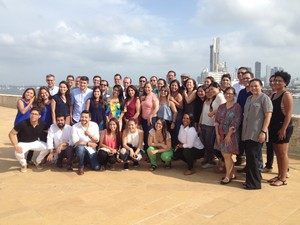A seminar on innovation in media opened the three-day programme. Kim Svendsen, Director of the Stibo Accelerator in Denmark and Stephen Fozard, Director of WAN-IFRA’s Global Alliance for Media Innovation (GAMI), showcased different approaches for media to engage with the tech and academic sectors to promote greater collaboration over future product development as well as enhance the potential sustainability of 21st Century media businesses.
Julie Kennedy, Head of User Experience at the Daily Mail Group, opened theDigital Strategies training stream. She explained the concept of customer journey mapping, which aims to create an increased understanding of the needs and preferences of customers and their behaviour - something crucial for media in promoting audience-centred content and repeat user experiences.
Greg Barber, Director of Digital News Projects at The Washington Post, took the Digital Strategies stream into a second day with a seminar focusing on the transition from print to digital and the many challenges for print reporters transitioning to a digital workflow.
In parallel, over 20 women media professionals participated in the Women Editorial Leadership stream. Juanita León, Founder of La Silla Vacía in Colombia, shared the successes and challenges of her career and opened a thorough debate on the difficulties that women editors face in their everyday life. Issues such as combining work and family life and the perception of women leaders in the newsroom were exposed, while participants also shared their experiences of conducting investigative journalism in very complex situations. The group exchanged tips on collaborative experiences and techniques as well as how to conduct successful investigative reporting with limited resources.
Paula Fray, founder of Fray Intermedia, followed up with a day of practical sessions on leadership and management in changing media environments, with participants analysing their organisational cultures and looking at how best to coach their teams.
The third day was dedicated to addressing media freedom challenges, with individual country groups discussing the most pressing issues in their respective countries and proposing solutions for their resolution. The Strengthening Media and Society programme’s Media Freedom Committee country representatives promoted the joint development of action plans and roadmaps to build solidarity between participating media, as well as to better reach and engage the communities in which they operate. Under the directives of the Committee, WAN-IFRA will support these plans over the coming months to assist advocacy at national and regional levels, aiming to support local media in their efforts to secure greater freedoms.
According to Colombian journalist Adriana Chica Garcia, the exchange of experience was one of the greatest benefits: “I liked that we had the opportunity to talk with people from different countries. Although we are from the same region there are cultural differences and we work in different ways. Therefore it was valuable to talk with each other and share our experiences.”
“It was an amazing experience with lots of learning,” added Mexican editor, Sofia Alvarez. “We will be able to take a lot from the sessions to implement back in our everyday work.”
Participants then had the opportunity to spend two days attending the WAN-IFRA World News Media Congress, where over 700 of the world’s top executives had gathered to discuss the latest developments and current challenges facing the global media industry, and where media freedom was high on the agenda.
The Strengthening Media and Society programme, funded through a two-year engagement between WAN-IFRA and the Ministry of Foreign Affairs of Denmark, seeks to build the internal capacity of media in developing countries and fragile states by strengthening digital actors, creating linkages between media, and empowering women media leaders. Addressing governance, accountability, professional safety, economic prosperity, poverty reduction and human rights issues, the Strengthening Media and Society programme also aims to tackle systemic threats to media freedoms by strengthening legal protections and encouraging knowledge exchange, promoting information sharing and solidarity activities between media, and building practical coalitions between media, civil society and decision-makers at the highest levels.
The event in Cartagena was the second in a series of four regional workshops that will welcome 160 media professionals from more than 60 media organisations. The first workshop took place in Amman (Jordan) and the programme will continue with workshops in Kuala Lumpur (Malaysia), and Grahamstown (South Africa), before developing into a comprehensive series of webinars and online support programmes; individualised coaching, mentoring and one-on-one professional development sessions; twinning opportunities and media exchanges; advocacy events and innovation grants.




